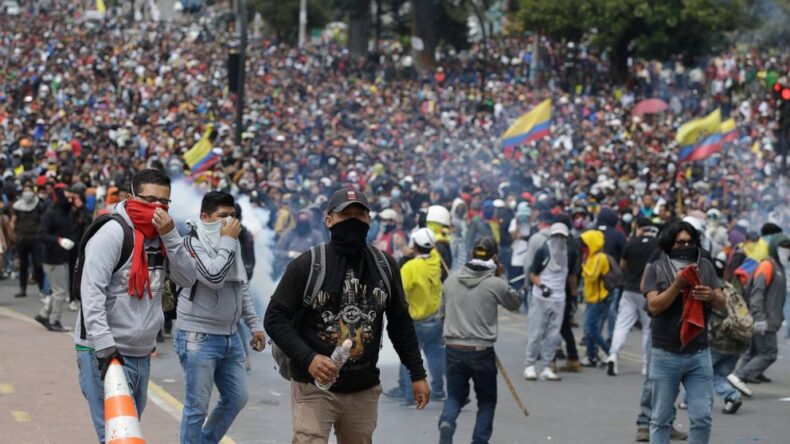Ecuadorian President Guillermo Lasso lifted the state of emergency he had declared in six provinces. The emergency was imposed to suppress the strike organized by the Confederation of Independent Nationalities. This is being said to be an unexpected move. See here.
It was announced following a hearing of an opposition petition to remove him from office in the National Assembly.
The strike began two weeks ago to demand lower gasoline prices, price controls on agricultural products, and a larger budget for education.
President Lasso accused the strikers, led by the Indigenous leaders, of plotting a coup. He previously stated that he is dedicated to defending the capital and the country.
“There are numerous protestors on the streets protesting for just magnifying causes. I explain to them that we listen to make decisions, always keeping everyone’s rights in mind,” he added further.
Earlier on the 16th of June, indigenous leader Leonidas Iza was released from police custody in Latacunga after being arrested and accused of halting the roads during nationwide protests.
Opposition lawmakers called the parliamentary session to protest Lasso’s role in the “serious political crisis and internal commotion” that has killed six civilians and injured dozens on both sides in 13 days of revolt.
The National Assembly of Ecuador started hearings on a no-confidence motion against the incumbent president on Saturday.
Following Saturday’s meeting, National Assembly President Virgilio Saquicela announced the formation of a commission to facilitate dialogue to end the strike.
In a statement announcing the decree to lift the state of emergency, the national government “ratifies the willingness to guarantee the formation of spaces for peace in which Ecuadorians can eventually resume their activities.”
The meeting took place in the Basilica church in Quito’s colonial district. It was attended by the government minister, Francisco Jiménez, Foreign Minister Juan Carlos Holgun, the president of the Confederation of Indigenous Nationalities of Ecuador, Leonidas Iza, and other social leaders.
“The (Indigenous confederation) chose to consult its bases before opting for a commission to begin this engagement. There has been no strong commitment “According to Saquicela.
Ecuador’s Confederation of Indigenous Nationalities’ Leonidas Iza has warned that the strike will continue until their demands are met. He added further;
Iza stated that strikers will rest over the weekend and requested that corridors be opened in interprovincial border areas to allow food to pass through and supply Quito, which is suffering from a farm product shortage.
Meanwhile, the opposition Union for Hope Party, which is affiliated with former President Rafael Correa, has called for Ecuadorian President Guillermo Lasso to be ousted from power. The request was made during a virtual legislative session.
It was based on the now-removed state of emergency declared over “grave internal commotions.”
Security personnel has warned that rubber pellets could be used to break up fights and that armed criminals have been known to sneak into protests.
The protesters have entered flower farms and oil fields. They have demanded that all oil and mining projects be halted. There has been speculation about the damage to the equipment at the facilities.
According to the energy ministry, the oil industry failed to produce 1 million barrels of crude, resulting in a $96 million loss.
The Mirador copper mine also declared that it has stopped operations because essential supplies can no longer reach it due to road closures.
The International Monetary Fund approved the release of $1 billion in funding for Ecuador on Friday, following two reviews of a $6.5 billion loan agreement, of which $4.8 billion has already been disbursed.
The payment is intended to help Ecuador recover economically from the COVID-19 pandemic, restore fiscal sustainability, and reduce public debt.












